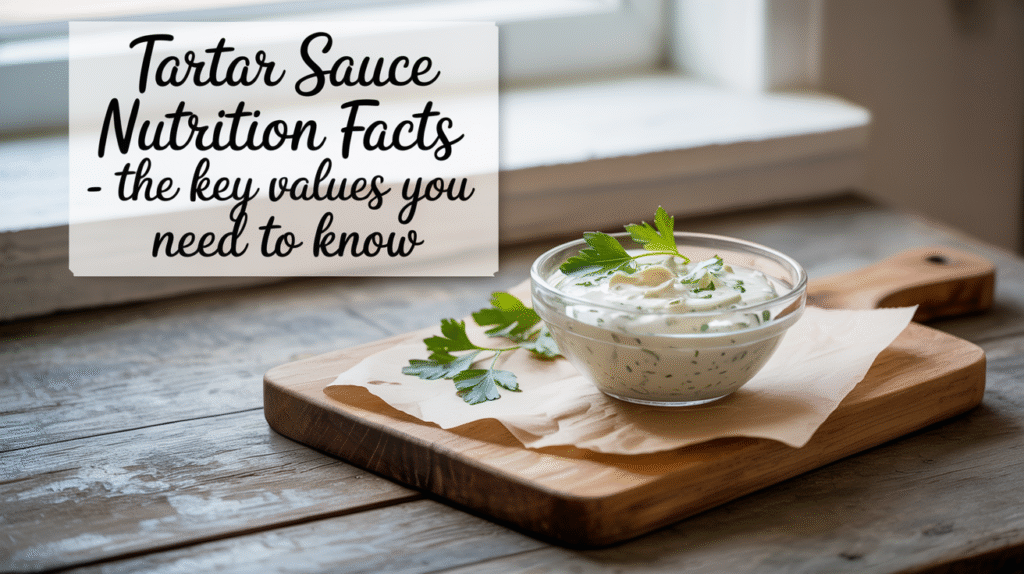Affiliate Disclosure: PantryBrands.co.uk is a participant in the Amazon.co.uk Associates Programme. As an Amazon Associate, we earn from qualifying purchases made through links on this site.
Tartar sauce is relatively high in calories and fat because it is mayonnaise‑based, but it also provides small amounts of vitamins and minerals such as vitamin K, folate and potassium. A typical tablespoon contains around 60–80 calories, most of which come from fat. Knowing the nutritional facts helps you use tartar sauce wisely without undermining a balanced diet.

Why nutritional knowledge of tartar sauce matters
Understanding what is in tartar sauce allows you to enjoy it while keeping an eye on your dietary goals. It can be part of a healthy diet if consumed in moderation.
Portion control and balance
The serving size of tartar sauce is often underestimated.
- A standard portion is 1 tablespoon, yet many diners use 3–4 tablespoons with fish and chips.
- Awareness of calories and fat content per tablespoon helps you manage your intake.
The role of fat in tartar sauce
Fat is the main nutrient in tartar sauce and comes mostly from oils used in mayonnaise.
- Provides flavour and texture but adds significant calories.
- Includes unsaturated fats (beneficial in moderation) and may contain some saturated fat depending on the recipe.
Macronutrient breakdown of tartar sauce
Looking closely at macronutrients offers a clearer picture of how tartar sauce fits into your diet.
Calories and energy contribution
Tartar sauce is energy‑dense compared with many condiments.
- Average 1 tablespoon = 60–80 calories.
- Most calories are from fat, with minor contributions from carbohydrates.
Fat content
Fat is the dominant macronutrient.
- Typically 6–8 grams of fat per tablespoon.
- Saturated fat ranges from 0.8–1.5 grams depending on oil type.
Carbohydrates and sugar
The carbohydrate content is relatively low but not negligible.
- Usually around 1–2 grams of carbohydrate per tablespoon.
- Trace sugars may be present from gherkins, relish or onions.
Protein
Tartar sauce is not a protein source.
- Less than 0.5 grams of protein per tablespoon.
- Insufficient to contribute meaningfully to daily protein intake.
Micronutrients in tartar sauce
Although primarily a condiment, tartar sauce does provide some vitamins and minerals.
Vitamins
Certain vitamins are present thanks to its ingredients.
- Vitamin K from plant oils supports blood clotting and bone health.
- Folate and vitamin B12 may be present in small amounts depending on added ingredients.
Minerals
Minerals add to tartar’s nutritional profile, though amounts are modest.
- Potassium from gherkins and herbs supports heart function.
- Sodium is often higher, ranging 100–200 mg per tablespoon, so it should be considered for salt‑sensitive individuals.
Comparing homemade and store‑bought tartar sauce
Nutrition varies significantly depending on whether tartar sauce is made at home or purchased in jars.
Homemade tartar sauce
Making it yourself gives more control over ingredients.
- Use yoghurt or light mayonnaise to reduce fat and calorie content.
- Adjust salt and sugar levels to meet personal dietary needs.
Store‑bought tartar sauce
Commercial versions often contain stabilisers and added sugar.
- Typically higher in sodium and preservatives.
- May include added oils, increasing calorie content compared with homemade.
Dietary considerations
Different dietary needs affect how tartar sauce should be consumed.
For weight management
Tartar sauce can be enjoyed in moderation.
- Keep portions to 1–2 tablespoons to limit calorie intake.
- Choose lighter versions or blend with Greek yoghurt.
For heart health
Fat quality is important.
- Prefer tartar made with oils rich in unsaturated fats.
- Monitor sodium intake if you have high blood pressure.
For special diets
Certain individuals need to adjust their intake.
- Gluten‑free eaters should check labels for thickeners or additives.
- Vegan tartar sauce can be made with plant‑based mayonnaise.
Practical ways to enjoy tartar sauce healthily
Small adjustments help keep tartar sauce in your diet without guilt.
Use as a side, not a main
Apply modest amounts.
- Serve in a small ramekin to control portions.
- Spread thinly instead of scooping directly from the jar.
Pair with healthier cooking methods
Balance tartar with cooking styles.
- Serve with grilled or baked fish rather than only fried foods.
- Combine with fresh salads to lighten overall meals.
FAQs
Here are some questions and answers about tartar sauce nutrition facts.
How many calories are in a tablespoon of tartar sauce?
On average, a tablespoon of tartar sauce contains 60–80 calories, with most of the calories coming from fat.
Is tartar sauce high in fat?
Yes, tartar sauce is high in fat because it is mayonnaise‑based. A tablespoon usually has 6–8 grams of fat, including some saturated fat.
Does tartar sauce contain protein?
No, tartar sauce provides negligible protein, less than 0.5 grams per tablespoon.
Is tartar sauce high in sodium?
Commercial tartar sauces can contain 100–200 mg of sodium per tablespoon, so it can be significant for those monitoring salt intake.
Can tartar sauce be part of a healthy diet?
Yes, tartar sauce can be part of a healthy diet when used in moderation, ideally paired with baked or grilled fish and balanced meals.
What is the healthiest way to make tartar sauce?
The healthiest versions use Greek yoghurt or light mayonnaise, fresh herbs, and reduced salt to lower fat, calorie and sodium content.
